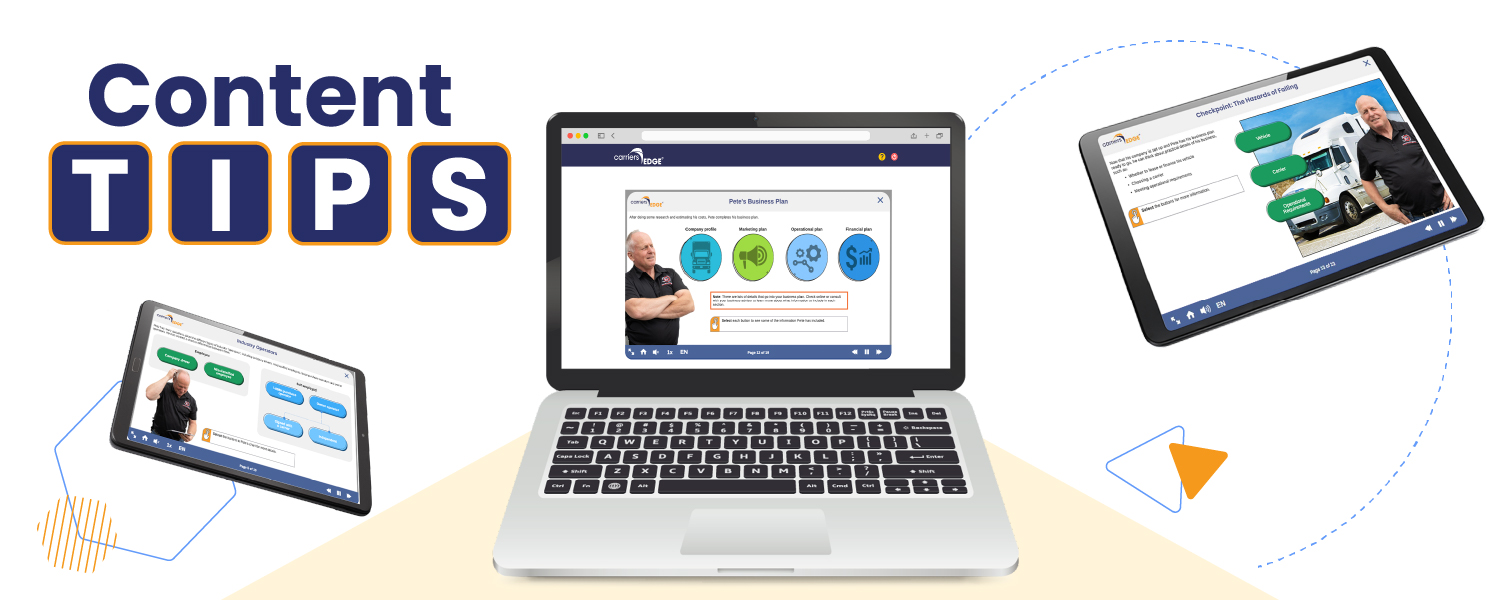
From company driver to owner operator: 5 essential tips for success
April 16, 2025
It takes a considerable amount of courage and confidence to make the jump from company driver to owner operator. The appeal is obvious—being your own boss, setting your own schedule, and increasing your income potential. However, it's a high-risk move, and poor planning or lack of preparation can quickly lead to business failure.
Financing, billing, maintenance, load planning—all of these responsibilities are now yours. The good news? Working smart and staying consistent can lead to financial freedom and long-term growth. Many successful owner-operators began with just one truck and a clear vision.
If you’re currently a company driver considering the switch, it’s wise to ask your carrier about any resources or support they can offer to help with the transition. In the meantime, here are five practical tips to guide you in making the leap successfully.
Define your vision: What kind of business do you want to run?
Success as an owner operator starts long before you buy your first truck—it's about clearly defining your business goals. Rather than jumping in based on high spot rates or market trends, take time to learn about the realities of owner operator life.
Think carefully about what type of freight you'll haul, your preferred routes (city versus highway), and your lifestyle needs, like desired home time and scheduling flexibility. Stick to what you know and gradually expand your expertise from there. If you're considering cross-border trucking, gaining firsthand experience with a cross-border carrier and obtaining a FAST card will simplify your transition.
Your business plan should outline your revenue streams, startup costs (registration, insurance, fuel taxes, permits), and ongoing expenses. It should also clearly define whether you'll run independently under your own authority or lease onto a carrier, since this significantly impacts your control, legal liabilities, and tax obligations.
Your current carrier may offer business planning tools or mentoring—ask what’s available to help you start your own business with confidence.
Funding your wheels: How you’ll finance your equipment
Securing your first truck is a major step—and one that's easy to get wrong if you're not careful. It’s crucial to explore all your financing options, from traditional loans through banks or credit unions to carrier-sponsored lease-purchase programs.
Bank financing typically offers greater independence and potentially better terms, but it also comes with stricter requirements and relies heavily on your credit score. Carrier lease-purchase programs can be an attractive alternative, but they vary significantly in quality and fairness.
Make sure to review contracts carefully so you fully understand payment expectations, potential deductions, and hidden fees. Before committing, have an experienced professional or lawyer review the agreement.
If you’re considering financing through your current carrier, ask them for clear explanations of their lease-purchase arrangements, including detailed breakdowns of costs, fees, and terms.
Avoiding breakdowns: Create a proactive maintenance plan
Breakdowns mean downtime, and downtime costs money. Proactive maintenance helps your truck stay compliant, reliable, and profitable. Mastering daily inspections—especially of critical components like brakes, tires, and lights—is essential for catching issues before they become expensive repairs. If vehicle inspections aren't yet your strength, seek training from a safety manager before investing in your own truck.
Also, plan how you'll handle ongoing maintenance. Independent ownership offers more freedom but demands careful attention to warranty details, especially for used trucks with limited coverage. Budget proactively for routine replacement of high-wear items like tires and lights.
Establishing a dedicated maintenance fund and building relationships with trusted service providers or carrier-managed shops can help keep your truck on the road. Check with your current carrier to see whether they offer maintenance resources or have a recommended service network for owner operators.
Behind the drive: Plan for the support services you'll need
Running a one-person trucking operation doesn't mean you have to handle every detail alone—but it does mean planning ahead. You'll need an efficient system to organize all your essential paperwork, such as receipts, shipping documents, registrations, permits, and logbooks, so you can quickly access them when needed.
You'll also want a reliable strategy to secure freight, especially when your primary carrier has less work available. Explore load boards and identify trustworthy ones to keep revenue flowing.
Don't overlook cybersecurity, either—load boards and broker websites can attract scams and cyber threats, so investing in strong passwords and a VPN will keep your business protected.
Additionally, cargo theft is a real concern. Plan your routes carefully, prioritize well-lit, secure parking locations, and consider equipping your truck with a dash cam for protection against cargo theft and traffic incidents alike.
Daily spending decisions: manage your day-to-day costs wisely
One of the best ways to set yourself up for success as an owner operator is to start thinking like one now. Instead of just looking at the rate per load, practice calculating your true cost per load and your actual profit margin.
Watch your daily expenses closely, since costs like meals, parking, mobile data, and truck washes quickly add up. Using truck-stop rewards programs can significantly reduce these recurring expenses. Efficient trip planning also boosts profitability, reducing unnecessary idling and wasted fuel. Use technology, such as apps for fuel price tracking, route planning, and organizing receipts, to simplify and streamline your daily operations. Ask your carrier whether they offer preferred fuel programs or educational resources on managing costs and cybersecurity best practices.
Final thoughts
Becoming an owner operator is about more than purchasing a truck—it's launching a strategic business. Success comes from careful planning, ongoing education, and realistic expectations. If you're serious about becoming an owner operator, consider exploring the CarriersEdge Owner Operator Business Skills course. It's designed specifically to help new trucking business owners navigate common challenges and build a sustainable operation, whether you're embarking independently or guiding others toward success. The course is available through all CarriersEdge subscriptions and individually through our website.